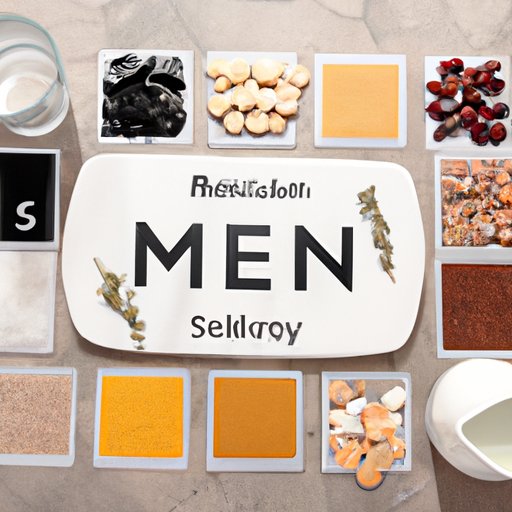Introduction
Minerals are essential nutrients that play a vital role in many aspects of our health and wellbeing. Mineral nutrition refers to the process of obtaining these necessary minerals from our diet, either through food sources or dietary supplements. In this article, we’ll explore what mineral nutrition is, why it’s important, and how to ensure you’re getting enough minerals in your diet.

Exploring the Essential Minerals for Human Health
We need a range of different minerals in order to stay healthy. Here’s a look at some of the most important ones:
Calcium
Calcium is one of the most abundant minerals in the body and plays an important role in bone health and muscle contraction. It’s also essential for nerve function and blood clotting. Foods rich in calcium include dairy products, leafy greens, almonds, and fortified tofu.
Magnesium
Magnesium is involved in hundreds of biochemical processes in the body, including energy production, DNA synthesis, and muscle and nerve function. It’s found in dark green leafy vegetables, nuts, legumes, and whole grains.
Potassium
Potassium helps regulate fluid balance, nerve impulses, and muscle contractions. It’s found in fruits and vegetables, especially bananas, potatoes, spinach, tomatoes, and avocados.
Iron
Iron is essential for carrying oxygen throughout the body and producing red blood cells. It can be found in lean meats, seafood, beans, and dark leafy vegetables.
Sodium
Sodium helps regulate blood pressure and fluid balance. Most of our sodium intake comes from processed foods and restaurant meals, as well as some natural sources such as celery and beets.
Zinc
Zinc is important for immune function, growth and development, wound healing, and cell division. It can be found in seafood, meats, eggs, nuts, and whole grains.
Selenium
Selenium is important for thyroid health, immunity, and reproductive health. It can be found in Brazil nuts, seafood, organ meats, and eggs.
How to Ensure You’re Getting Enough Minerals in Your Diet
In order to get enough minerals in your diet, it’s important to eat a variety of nutrient-dense foods. Here are some tips to help you do just that:
Eat a Variety of Fruits and Vegetables
Fruits and vegetables are great sources of minerals, as well as other essential vitamins and nutrients. Aim for five servings per day and try to eat a variety of colors in order to get the widest range of nutrients possible.
Increase Intake of Whole Grains
Whole grains are packed with minerals like magnesium and zinc. Look for whole grain breads, pastas, and cereals, and aim for three servings per day.
Choose Lean Proteins
Lean proteins are excellent sources of minerals like iron and zinc. Choose lean meats like poultry, fish, and lean cuts of beef, as well as plant-based proteins like tofu and beans.
Limit Processed Foods
Processed foods are often stripped of their natural minerals during processing. Try to limit your intake of processed foods and opt for fresh, whole foods whenever possible.

Common Deficiencies: What to Look Out For
It’s possible to have a mineral deficiency even if you’re eating a healthy, balanced diet. Here’s what to look out for:
Signs and Symptoms of Deficiency
The signs and symptoms of mineral deficiencies vary depending on the mineral in question. Common signs of deficiency include fatigue, weak bones, brittle nails, poor hair and skin, and tingling or numbness in the extremities.
Risk Factors
Certain people may be at greater risk of mineral deficiencies, including pregnant women, athletes, vegans, and people with digestive disorders. If you’re concerned you may be deficient in any minerals, speak to your doctor or healthcare professional.

The Benefits of Supplementing with Mineral Nutrients
Supplementing with mineral nutrients can provide numerous health benefits, including:
Improved Health and Wellness
Getting enough minerals in your diet is essential for optimal health and wellbeing. Supplementing with mineral nutrients can help prevent deficiencies and ensure you’re getting all the minerals you need to stay healthy.
Enhanced Performance
Minerals are essential for maintaining energy levels, cognitive function, and muscle strength. Taking mineral supplements can help enhance athletic performance and reduce recovery time after physical activity.
A Guide to Choosing Quality Mineral Supplements
When choosing mineral supplements, it’s important to do your research and make sure you’re getting the best quality product. Here are some tips to help you find the right supplement for you:
Research Brands and Ingredients
Take the time to research brands and ingredients to make sure you’re getting a quality product. Look for reputable companies with third-party certifications and check reviews to see what other customers are saying.
Check Labels
Always read labels carefully and look for products that contain only natural, organic ingredients. Avoid supplements that contain artificial sweeteners, fillers, and other unnecessary additives.
Consult with a Healthcare Professional
If you’re unsure about which supplements are right for you, consult with a healthcare professional. They can give you personalized advice based on your individual needs and health goals.
Conclusion
In conclusion, mineral nutrition is essential for good health and wellbeing. Eating a variety of nutrient-dense foods is the best way to get the minerals you need, but supplementing with high-quality mineral nutrients can be beneficial as well. By following the tips outlined in this article, you can ensure you’re getting enough minerals in your diet and reaping the associated health benefits.
(Note: Is this article not meeting your expectations? Do you have knowledge or insights to share? Unlock new opportunities and expand your reach by joining our authors team. Click Registration to join us and share your expertise with our readers.)
